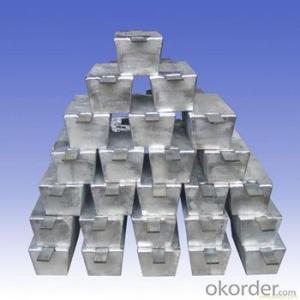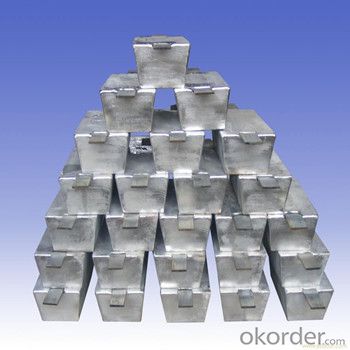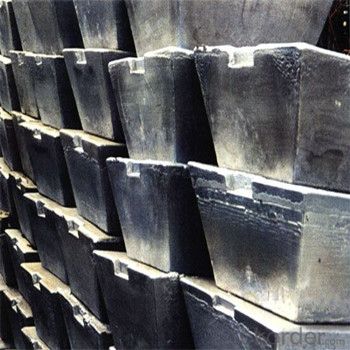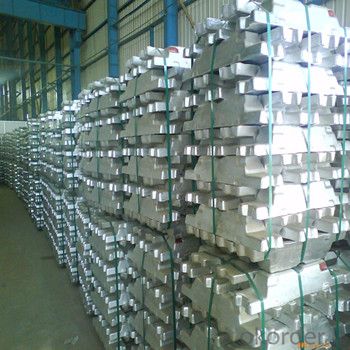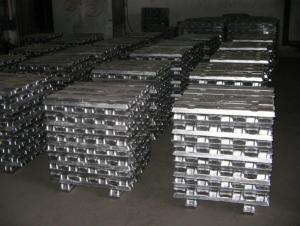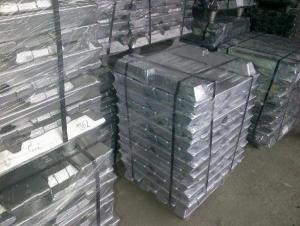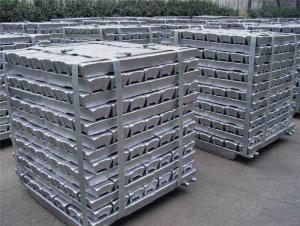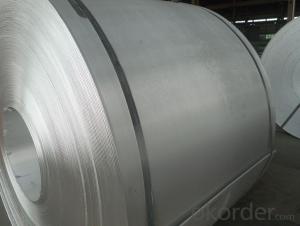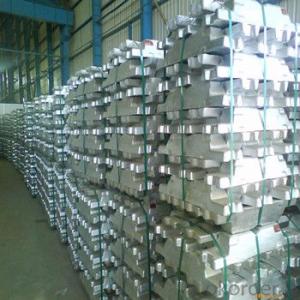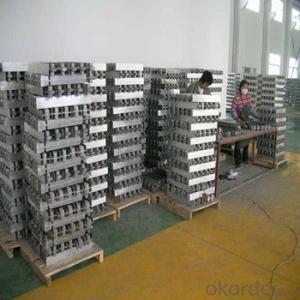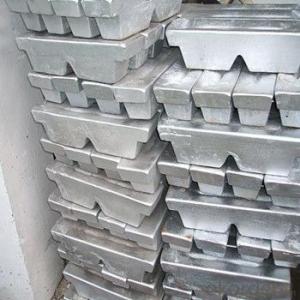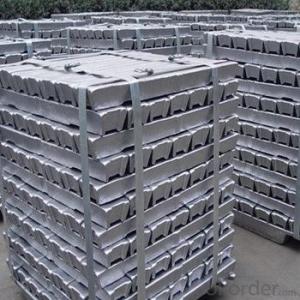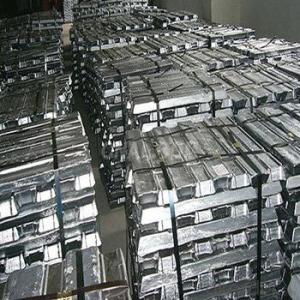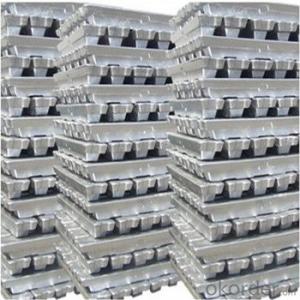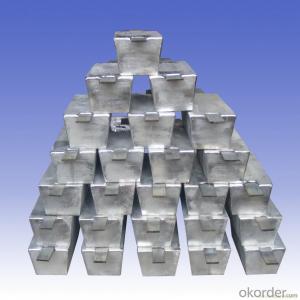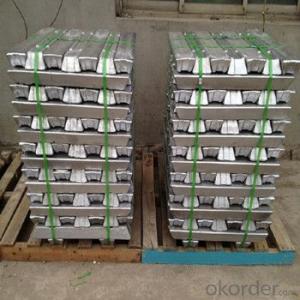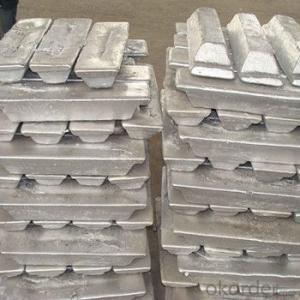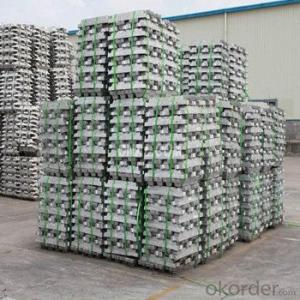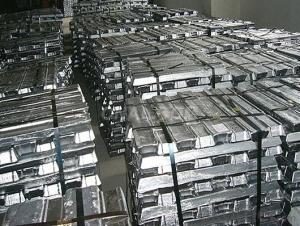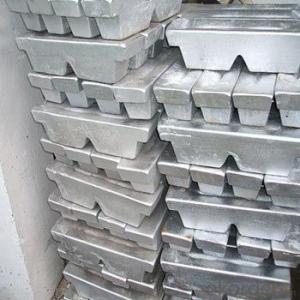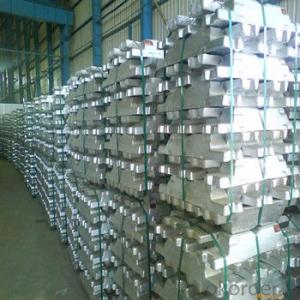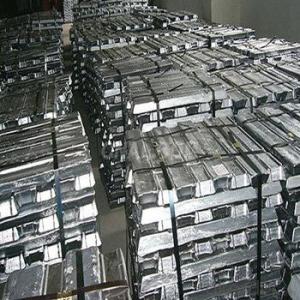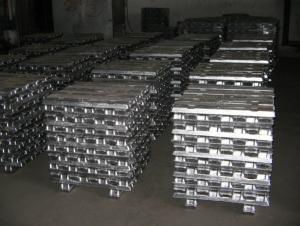Aluminum Ingot Primary/ Pure Aluminium Ingot/Aluminium Ingot 99.7%
- Loading Port:
- China main port
- Payment Terms:
- TT OR LC
- Min Order Qty:
- 1000 m.t.
- Supply Capability:
- 10000 m.t./month
OKorder Service Pledge
OKorder Financial Service
You Might Also Like
Pure Aluminum Ingot Used for Industry
1.Structure of Aluminum Ingot Description
An ingot is a piece of material, usually metal, that is cast into a shape suitable for further processing. Insteelmaking, it is the first step among semi-finished casting products. Ingots usually require a second procedure of shaping, such as cold/hot working, cutting, or milling to produce a useful final product. Non-metallic and semiconductor materials prepared in bulk form may also be referred to as ingots, particularly when cast by mold based methods.
2.Main Features of the Aluminum Ingot
•High Purity
•High strength
•Fast melting
•Best price
•Good after-service
3. Aluminum Ingot Images
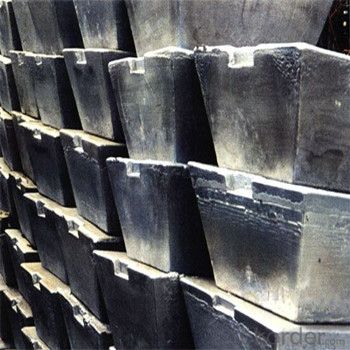
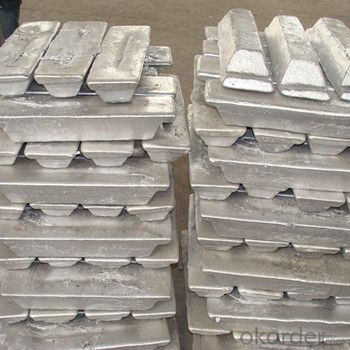
4. Aluminum Ingot Specification
Grade | Chemical Composition % | |||||||||
Al≥ | impurities ≤ | |||||||||
Si | Fe | Cu | Ga | Mg | Zn | Mn | others | Sum | ||
Al99.9 | 99.90 | 0.50 | 0.07 | 0.005 | 0.02 | 0.01 | 0.025 | - | 0.010 | 0.10 |
Al99.85 | 99.85 | 0.80 | 0.12 | 0.005 | 0.03 | 0.02 | 0.030 | - | 0.015 | 0.15 |
Al99.7 | 99.70 | 0.10 | 0.20 | 0.010 | 0.03 | 0.02 | 0.030 | - | 0.030 | 0.30 |
Al99.6 | 99.60 | 0.16 | 0.25 | 0.010 | 0.03 | 0.03 | 0.030 | - | 0.030 | 0.40 |
Al99.5 | 99.50 | 0.22 | 0.30 | 0.020 | 0.03 | 0.05 | 0.050 | - | 0.030 | 0.50 |
Al99.00 | 99.00 | 0.42 | 0.50 | 0.020 | 0.03 | 0.05 | 0.050 | - | 0.050 | 1.00 |
5.FAQ of Aluminum Ingot
We have organized several common questions for our clients,may help you sincerely:
①How about your company?
A world class manufacturer & supplier of castings forging in carbon steel and alloy steel,is one of the large-scale professional investment casting production bases in China,consisting of both casting foundry forging and machining factory. Annually more than 8000 tons Precision casting and forging parts are exported to markets in Europe,America and Japan. OEM casting and forging service available according to customer’s requirements.
②How to guarantee the quality of the products?
We have established the international advanced quality management system,every link from raw material to final product we have strict quality test;We resolutely put an end to unqualified products flowing into the market. At the same time, we will provide necessary follow-up service assurance.
③How long can we receive the product after purchase?
In the purchase of product within three working days, We will arrange the factory delivery as soon as possible. The pecific time of receiving is related to the state and position of customers.Commonly 7 to 10 working days can be served.
- Q: How are aluminum ingots used in the production of beverage cans?
- The production of beverage cans heavily relies on aluminum ingots, which have a vital role. These ingots undergo the process of melting and casting into large blocks. The blocks are further rolled into thin aluminum sheets, which are then cut into smaller pieces to form the primary structure of the can. To create the can body, the aluminum sheets are molded into cylindrical shapes and subsequently welded together. The top and bottom sections of the can, typically composed of a different aluminum alloy, are added. To preserve the taste and quality of the beverage while preventing corrosion, a protective layer is applied to the can. The utilization of aluminum ingots in beverage can production brings various advantages. Aluminum's lightweight nature facilitates easy transportation and stacking of cans. Its high malleability allows for intricate shaping and design possibilities. Additionally, aluminum's resistance to corrosion ensures the longevity of the cans and the preservation of the beverage's quality. Moreover, aluminum is a sustainable and recyclable material. By incorporating recycled aluminum into the manufacturing process, energy consumption and environmental impact are significantly reduced compared to using new aluminum. This makes aluminum cans an environmentally friendly packaging solution. In conclusion, aluminum ingots are indispensable in the production of beverage cans. They undergo a series of transformations, from melting to casting, rolling, and shaping, ultimately forming the main body of the can. Aluminum's lightweight, malleability, corrosion resistance, and recyclability make it an optimal material for beverage cans, offering convenience, durability, and environmental benefits.
- Q: How is an aluminum ingot made?
- An aluminum ingot is made through a process called smelting. The first step in the production of an aluminum ingot is the extraction of alumina from bauxite ore. Bauxite is first mined and refined to obtain alumina, which is a white powder-like substance. The alumina is then mixed with cryolite, a mineral that lowers the melting point of alumina, and placed in large pots called electrolytic cells. These cells are lined with carbon cathodes and act as the containers for the smelting process. Electricity is passed through the cells, causing a chemical reaction that separates the oxygen from the alumina. The oxygen combines with the carbon from the cathodes, creating carbon dioxide, while the aluminum ions are reduced to aluminum metal. The molten aluminum collects at the bottom of the cells and is periodically drained out. Once the molten aluminum is drained, it is usually transported to a casting facility. Here, the liquid metal is poured into molds to shape it into ingots. These molds can have various shapes and sizes, depending on the desired final product. The aluminum is then allowed to cool and solidify, forming the ingots. After solidification, the ingots are typically inspected for quality and purity. They may undergo further processing, such as heat treatment or surface finishing, depending on their intended use. Overall, the production of an aluminum ingot involves the extraction of alumina from bauxite, smelting alumina to obtain aluminum metal, and casting the molten metal into ingots. This process ensures the creation of high-quality aluminum ingots that can be used in various industries, including automotive, construction, and aerospace.
- Q: Who knows where needs aluminium ingot, aluminium powder, aluminium grain?
- 1. machinery raw materials factory.2. heat treatment smelting process.
- Q: What are the common defects found in aluminum ingots?
- Common defects found in aluminum ingots include shrinkage porosity, hot tearing, gas porosity, inclusions, segregation, and surface cracks. These defects can negatively impact the quality and mechanical properties of the aluminum ingots, leading to potential issues during subsequent processing and manufacturing.
- Q: How are aluminum ingots tested for quality?
- Aluminum ingots are tested for quality through a series of rigorous procedures to ensure that they meet the required standards. The testing process typically includes both physical and chemical analysis. One of the primary tests conducted on aluminum ingots is the examination of their visual appearance. Inspectors carefully inspect the ingots for any surface defects, such as cracks, dents, or any other abnormalities. This helps to determine the overall quality and integrity of the ingots. In addition to visual inspection, various mechanical tests are performed to assess the strength and durability of the aluminum ingots. Tensile strength tests are conducted to measure the maximum amount of stress the ingots can withstand before breaking. These tests help determine the structural integrity and resistance to external forces. Chemical analysis is another crucial aspect of quality testing for aluminum ingots. This involves determining the chemical composition and purity of the metal. In this process, samples are taken from the ingots and analyzed using techniques such as spectroscopy or mass spectrometry to identify the presence of any impurities or elements that may affect the quality of the aluminum. The density and hardness of the ingots are also measured to ensure that they meet the required specifications. Density testing helps determine the uniformity of the molten metal during the casting process, while hardness testing provides insight into the strength and resistance of the ingots. Furthermore, non-destructive testing methods, such as ultrasonic testing or X-ray inspection, are employed to detect any internal defects or inconsistencies within the ingots. These techniques help identify any hidden flaws that may compromise the quality of the aluminum. Overall, aluminum ingots undergo a comprehensive testing process that includes visual inspection, mechanical testing, chemical analysis, density and hardness measurements, and non-destructive testing. These tests ensure that the ingots meet the necessary quality standards, making them suitable for further processing and use in various industries.
- Q: How much is a ton of aluminium ingots now?
- Futures: the Fed announced interest rate hike, the dollar frustrated, overnight aluminum rose $23 to $1884 / ton; Shanghai aluminum night plate affected by the outer disk, the strong side of the shock operation;
- Q: What are the safety precautions when handling aluminum ingots?
- When handling aluminum ingots, it is important to follow certain safety precautions to prevent accidents and ensure the well-being of individuals involved. Here are some safety precautions to consider: 1. Personal Protective Equipment (PPE): Always wear appropriate PPE, including safety glasses, gloves, and protective clothing, when handling aluminum ingots. This helps protect against potential hazards, such as sharp edges, splinters, or contact with the metal. 2. Proper Lifting Techniques: Aluminum ingots can be heavy, so it is crucial to use proper lifting techniques to avoid strains or injuries. Bend at the knees and lift with your legs, keeping your back straight. If the ingot is too heavy, seek assistance or use mechanical aids like cranes or forklifts. 3. Secure Storage and Handling: Store aluminum ingots in a secure manner to prevent them from rolling or falling. Stack them in stable piles, using appropriate stacking equipment if necessary. Avoid storing them near flammable materials or in areas with inadequate ventilation. 4. Fire Safety: Aluminum can ignite if exposed to high temperatures or sparks. Therefore, it is important to keep ingots away from open flames, sparks, or potential ignition sources. Additionally, have fire extinguishers readily available in case of emergencies. 5. Hazard Awareness: Be aware of the potential hazards associated with aluminum ingots, such as sharp edges, friction burns, or the risk of metal fumes. Take necessary precautions to avoid these risks, such as wearing appropriate gloves, using tools with safety guards, or working in well-ventilated areas. 6. Training and Education: Ensure that individuals handling aluminum ingots receive proper training and education on safe handling practices. This includes understanding the potential hazards, knowing how to use equipment properly, and being aware of emergency procedures. 7. Regular Inspections: Regularly inspect aluminum ingots for any signs of damage, such as cracks or sharp edges. Remove any damaged ingots from use, as they can pose an increased risk of accidents or injuries. By following these safety precautions, individuals can minimize the risks associated with handling aluminum ingots and create a safer working environment.
- Q: Does aluminum ingots produced without aluminum ore belong to metal smelting?
- The production of aluminium ingots without aluminum ore belongs to metal smelting.Without the use of aluminum ore, aluminum is also extracted from the compound and turned into free aluminum
- Q: Can aluminum ingots be anodized?
- Yes, aluminum ingots can be anodized. Anodizing is an electrochemical process that forms a protective oxide layer on the surface of aluminum. This process can be applied to aluminum ingots, sheets, or other forms. Anodizing provides several benefits such as increased corrosion resistance, improved durability, and the ability to add color to the surface. The anodized layer also enhances the aesthetic appearance of the aluminum and allows for better adhesion of paints or dyes. Overall, anodizing aluminum ingots is a common practice in various industries to enhance the properties and appearance of the metal.
- Q: How are aluminum ingots used in the production of power transmission towers?
- Aluminum ingots are used in the production of power transmission towers due to their lightweight and high strength properties. These ingots are melted down to create aluminum alloys, which are then cast into various components of the towers such as lattice structures, cross arms, and braces. The lightweight nature of aluminum makes it an ideal material for power transmission towers as it reduces the overall weight of the structure, making it easier and more cost-effective to transport and install. This is particularly advantageous in areas with difficult terrains or remote locations. Moreover, aluminum alloys offer excellent corrosion resistance, ensuring the longevity and durability of the power transmission towers. They can withstand harsh weather conditions, including extreme temperatures, humidity, and exposure to saltwater or chemicals. Additionally, aluminum ingots are highly malleable, allowing for easy fabrication and customization of tower components to meet specific design requirements. This flexibility enables engineers to create intricate lattice structures that can support heavy loads while maintaining stability. Aluminum's electrical conductivity is another key factor in its use for power transmission towers. It allows for efficient transmission of electricity with minimal power loss. This is crucial in maintaining the reliability and efficiency of the power grid. Overall, aluminum ingots play a vital role in the production of power transmission towers by providing lightweight, corrosion-resistant, and electrically conductive materials. Their use contributes to the construction of reliable, durable, and cost-effective infrastructure for transmitting electricity across long distances.
Send your message to us
Aluminum Ingot Primary/ Pure Aluminium Ingot/Aluminium Ingot 99.7%
- Loading Port:
- China main port
- Payment Terms:
- TT OR LC
- Min Order Qty:
- 1000 m.t.
- Supply Capability:
- 10000 m.t./month
OKorder Service Pledge
OKorder Financial Service
Similar products
Hot products
Hot Searches
Related keywords
